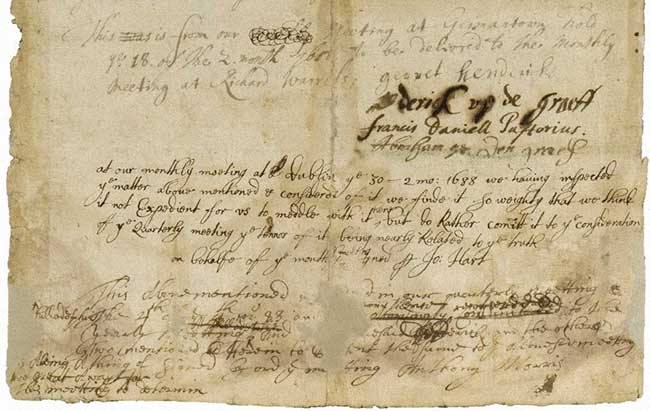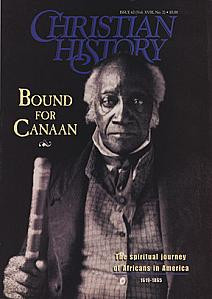WHAT GAVE CHRISTIANS THE RIGHT TO ENSLAVE OTHER PEOPLE?

[Above: Detail of the signatures on the Germantown Protest.—from public domain Wikimedia File:The 1688 Germantown Quaker petition against slavery.jpg]
IN GERMANTOWN, Pennsylvania, a historic marker commemorates a historic protest. The event took place almost one hundred years before the United States became a nation and almost two hundred years before America’s Civil War. On this day, 18 April 1688,* four Friends (Quakers) protested slavery.
The four had recently emigrated from Germany. Francis Daniell Pastorius, Garret Henderich, Derick up de Graeff, and Abraham jr. den Graef had suffered persecution in their homeland. Their experiences may have made them sensitive to the distress of others.
Their indignation took the form of a letter:
These are the reasons why we are against the traffic of men-body, as followeth. Is there any that would be done or handled at this manner? viz. to be sold or made a slave for all the time of his life? . . . There is a saying that we shall do to all men like as we will be done ourselves; making no difference of what generation, descent or colour they are. And those who steal or robb men, and those who buy or purchase them, are they not all alike?
The four complained that those who held Blacks in bondage often forced them into adultery by selling spouses away from each other. Slave holders also sold Black children away from their parents. What gave Christians the right to do such things? Reverse the roles and Whites would consider themselves heroes for fighting against those who enslaved them. Yet they called Blacks wicked when they struggled for freedom. Reports of such doings made European Quakers leery of migrating to the New World.
This historic statement against human enslavement is known as the Germantown Protest. The authors submitted it to the Monthly Meeting at Richard Worrell’s. The Friends at Worrell’s in turn passed it to the Quakers’ quarterly meeting. From there it went to the big Yearly Meeting, “it being a thing of too great a weight for this [the quarterly] meeting to determine.” After that it disappeared until rediscovered in the nineteenth century.
The Germantown Protest may be the first American statement of universal human rights.
—Dan Graves
*By the old (Julian) calendar, “ye 18 of the 2 month, 1688.”
----- ----- -----
For more on the African experience in America, read Christian History #62, Bound for Canaan






